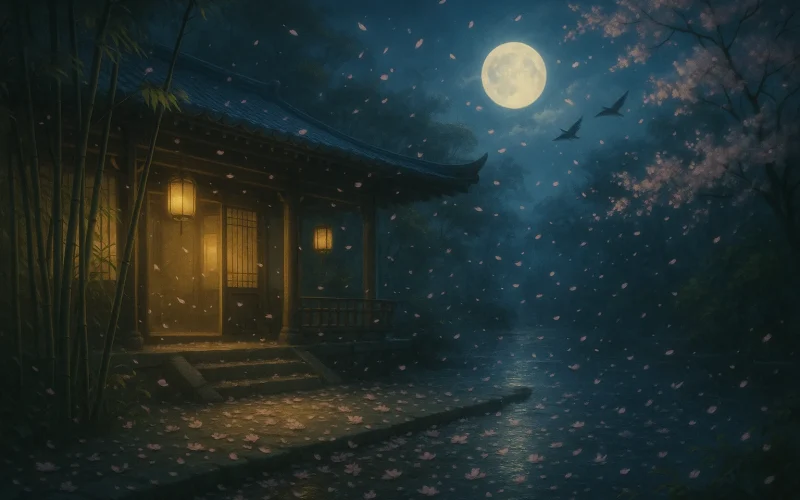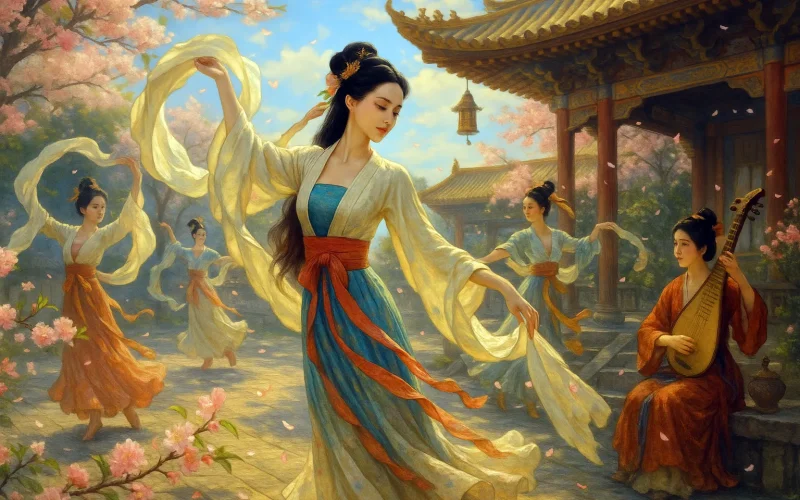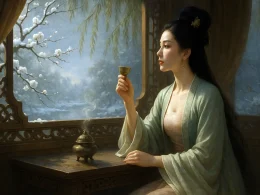The moon wanders over the spring garden's grace,
The bamboo hall opens as night invades the space.
Startled birds sweep through the woods in flight,
Blossoms on breeze come across water's light.
Original Poem
「春夜」
虞世南
春苑月裴回,竹堂侵夜开。
惊鸟排林度,风花隔水来。
Interpretation
This poem was composed in the year 637 AD (the 11th year of the Zhenguan era of Emperor Taizong of Tang) during the Dingyou New Year. At that time, Yu Shinan was favored by Emperor Taizong and granted an estate in Yongxing, where he spent the New Year in Gaoling City. While strolling through a garden on a moonlit night, amidst bamboo shadows and the moonlight, the poet keenly captured the liveliness and freshness of a spring night, leading to the creation of this poem. Though short, this five-character quatrain uses an extremely concise brush to depict the bright and beautiful mood of a spring night garden, reflecting the poet’s tranquil, leisurely state of mind and aesthetic pursuit.
First Couplet: "春苑月裴回,竹堂侵夜开。"
Chūn yuàn yuè péi huí, zhú táng qīn yè kāi.
In the spring garden, the moon lingers and wanders;
The bamboo hall opens into the deepening night.
"Spring garden" (春苑 chūn yuàn) establishes the season and setting, while "lingers and wanders" (裴回 péi huí) conveys the gentle, meandering movement of the moonlight, creating a soft and lively atmosphere. "Bamboo hall" (竹堂 zhú táng) refers to a hall surrounded by bamboo, opening into the night, suggesting a leisurely and serene lifestyle. These two lines—one still, one beautiful—paint a quiet and elegant scene under the moonlight, immersing the reader in a peaceful and refined mood, as if the poet is wandering alone with a clear and carefree heart.
Second Couplet: "惊鸟排林度,风花隔水来。"
Jīng niǎo pái lín dù, fēng huā gé shuǐ lái.
Startled birds sweep through the forest in flight;
Scented blossoms cross the water on the breeze.
These lines shift from stillness to motion. "Startled birds" (惊鸟 jīng niǎo), disturbed by some faint sound, fly through the woods in a group; "sweep through" (排林度 pái lín dù) gives the scene dynamism and force, capturing a moment of vitality in the spring night.紧接着 (jǐn jiē zhe, immediately after), "scented blossoms cross the water on the breeze" (风花隔水来 fēng huā gé shuǐ lái) combines wind and floral fragrance, engaging the senses of smell and sensation. The fragrance drifting across the water adds a hazy and elegant charm to the scene. Thus, the imagery unfolds layer by layer—from visual to auditory to olfactory—offering a multi-sensory experience. The poet’s observation of nature is both meticulous and full of charm, vividly portraying the lively beauty of the night.
Holistic Appreciation
The poem is short and exquisite, yet it captures the depth and liveliness of a spring night. The opening two lines depict the moonlight and bamboo hall, creating a serene and graceful atmosphere; the latter two lines seize the momentary dynamics and scents of nature, filling the night garden with vitality and charm. Through limited words, the poet constructs an意境 (yìjìng, artistic conception) that engages multiple senses: the visual beauty of the wandering moon, the dynamic image of birds sweeping through the forest, and the olfactory experience of fragrance carried across the water. Thus, the garden at night is not just a static painting but a flowing poetic realm.
Artistic Merits
- Balance of stillness and motion, clear layers: Moving from stillness to motion, scene to emotion, the imagery is richly layered.
- Multi-sensory integration: Visual (moon, bamboo hall), auditory (sound of birds’ wings), and olfactory (scent of blossoms on the breeze) elements create a three-dimensional atmosphere.
- Simple and fresh language: The wording is plain and unadorned, yet subtle and elegant, consistent with Yu Shinan’s characteristic "clear and refined style."
- Keen capture of the momentary: The description of startled birds and wind-blown blossoms shows the poet’s sensitivity to the transient beauty of nature.
Insights
This poem reminds us that beauty often lies in life’s small details—a momentary play of light and shadow, a faint sound, or a passing fragrance. If one can observe with a calm and clear heart, these can be transformed into poetic solace for the soul. It inspires people to maintain keen observation and a love for nature in daily life, allowing the heart to dwell in freshness and peace.
About the Poet

Yu Shinan (虞世南 558 - 638), a native of Yuyao in Zhejiang Province, was a prominent statesman, writer, calligrapher, and politician during the Zhenguan era of the early Tang dynasty. As one of the "Twenty-Four Meritorious Officials of Lingyan Pavilion," he rose to the position of Director of the Imperial Library. His calligraphy earned him a place among the "Four Great Calligraphers of the Early Tang," alongside Ouyang Xun, Chu Suiliang, and Xue Ji. In poetry, he inherited the tradition of Xu Ling and pioneered a refined, balanced, and harmonious courtly style. He also compiled the North Hall Book Excerpts, establishing a new genre of encyclopedic literature.












